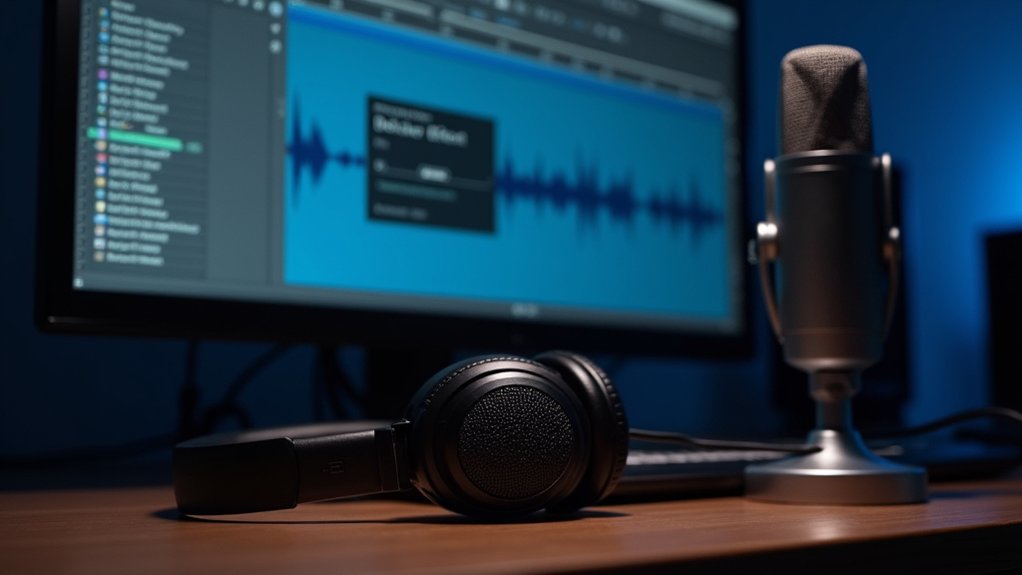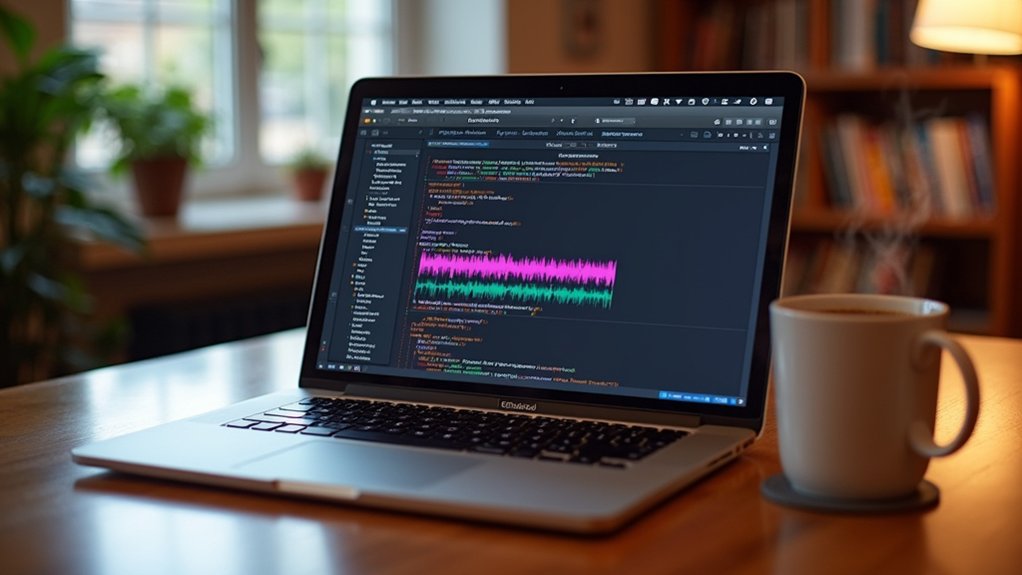Audacity is a legitimate and widely used open-source audio editor, operating under the GNU General Public License. However, trust issues have emerged after its acquisition by Muse Group and changes to its privacy policy, which now allow greater data collection. These updates have prompted community backlash, the rise of alternatives, and questions about alignment with open-source principles. Concerns about software integrity and user privacy remain central. Exploring these topics further reveals important factors shaping Audacity’s current reputation.
Key Takeaways
- Audacity is open-source software licensed under the GNU GPL, but recent privacy policy changes have raised concerns over data collection and user privacy.
- Muse Group’s 2021 acquisition of Audacity has led to community mistrust regarding software direction and adherence to open-source values.
- The introduction of telemetry and data sharing in recent versions has caused some users to view Audacity as potentially spyware-like.
- Many users now prefer older versions or privacy-focused forks like Sneedacity to avoid unwanted data collection.
- While still technically legit, Audacity’s reputation and user trust have declined, prompting calls for greater transparency and accountability.
Audacity’s Open-Source Roots and Recent Ownership Changes
Audacity, a prominent example of open-source audio editing software, has been a staple tool for musicians, podcasters, and audio engineers since its launch in 2000.
Its cross-platform compatibility and free access have established it as a cornerstone within the audio editing community.
In 2021, Audacity underwent a significant shift when Muse Group acquired the project.
This change prompted concerns among users regarding potential changes to software licensing, the direction of development, and the preservation of its open-source ethos.
The introduction of a new privacy policy and the possibility of increased data collection fueled skepticism about the software’s future.
Consequently, users’ trust in Audacity and Muse Group has been affected, leading to ongoing discussions within the community about the best path forward.
Privacy Policy Updates and Data Collection Concerns
Following the release of updated privacy policies, significant apprehension has arisen within the user community regarding the extent and nature of data collection practices implemented in the software.
The latest Audacity version introduced telemetry features, allowing Muse Group to collect personal data, including real IP addresses for a limited time. This shift has sparked debate over compliance with open-source principles and the software’s handling of sensitive information.
The privacy policy’s ambiguity, particularly around data sharing with international offices, has led to pronounced community concerns and eroded user trust. Many users have responded by exploring alternatives and considering forks to eliminate telemetry.
- Retention of real IP addresses for one day before hashing
- Potential sharing of personal data with Muse Group’s offices abroad
- Telemetry features introduced in Audacity version 3.03
Understanding Audacity’s New Age Rating and Its Implications
Audacity’s recent shift to a PG-13 age rating has raised questions regarding the motivations behind this decision and its necessity.
This change has sparked significant debate within the user community, with many expressing concern over reduced accessibility and a perceived departure from open-source principles.
The community’s reaction highlights broader apprehensions about the software’s direction and its alignment with user expectations under new ownership.
Reasons for PG-13 Rating
The implementation of a PG-13 rating for Audacity marks a significant shift in the software’s accessibility and community perception. Following Muse Group’s acquisition, this decision has fueled debates regarding the underlying motivations for such an age restriction, especially given Audacity’s longstanding reputation as an open source tool accessible to all.
Several reasons have been cited for this change:
- Data Collection and Privacy Policy: The updated privacy policy, which introduces new data collection practices, may have prompted the PG-13 rating to comply with regulations concerning minors.
- Community Concerns and Trustworthiness: The rating has heightened community concerns about transparency and trust within the open source ecosystem.
- Software Accessibility for Young Audio Editors: Restricting younger users potentially limits opportunities for aspiring audio editors, contradicting Audacity’s previous ethos of universal accessibility.
Community Reaction Overview
Curiously, the introduction of a PG-13 age rating for Audacity has ignited considerable debate within the open source community, with many users questioning both its necessity and its impact on accessibility.
The community reaction, particularly on platforms like GitHub and Reddit, has been marked by concerns over privacy, data collection, and adherence to GPL licensing. Critics argue that linking data collection to the age rating undermines Audacity’s status as free software and introduces new trust issues, especially following Muse Group’s acquisition.
Some users propose forking Audacity to bypass the new restrictions, reflecting a broader unease with the software’s direction. The age rating’s mixed reception highlights fundamental questions about transparency and the role of open source stewardship under Muse Group’s management.
Community Backlash and the Push for Audacity Alternatives
Following changes to Audacity’s privacy policy under Muse Group, users have raised significant concerns about data collection and potential surveillance.
This controversy has spurred discussions about forking the software and has increased interest in competing audio editors that emphasize privacy and transparency.
As a result, the community’s trust in Audacity has diminished, driving adoption of alternatives and older, less intrusive versions.
Privacy Policy Controversy
Amid growing scrutiny over software privacy standards, Audacity’s revised privacy policy has triggered significant concern within its user community.
The policy update, implemented after the Muse Group acquisition, allows for extensive data collection, including potential sharing of personal data with authorities in Russia and the USA.
This move has undermined user trust in the open source project and sparked widespread community backlash.
The introduction of telemetry features in version 3.03 has intensified fears that Audacity is adopting spyware-like practices.
In response, users are increasingly seeking alternatives and privacy-conscious solutions.
- New privacy policy enables broad data collection and sharing of personal data.
- User trust eroded, leading to calls for Audacity’s removal from Linux repositories.
- Alternatives like Ocenaudio and Sneedacity gain attention due to privacy concerns.
Calls for Software Forks
As discontent over Audacity’s revised privacy policy mounted, the open-source audio editing community rapidly mobilized to propose software forks that would restore user trust and safeguard privacy.
Following the Muse Group’s introduction of new data collection practices, significant community backlash emerged, particularly across forums such as GitHub and Reddit. Users voiced concerns about the privacy policy’s allowance for data sharing with international offices, prompting calls for alternatives that prioritize user privacy.
Efforts to create software forks gained momentum, with contributors seeking to remove telemetry features and revert to earlier, more transparent practices. Many recommended reverting to older versions of Audacity, such as 2.4.2, or compiling from source to avoid unwanted data collection.
Alternatives like Ocenaudio and Sneedacity were also widely discussed.
Rise of Competing Editors
Discussions around forking Audacity and restoring its prior privacy standards quickly expanded into a broader movement supporting alternative audio editors.
After Muse Group introduced a controversial privacy policy and new data collection practices, users voiced concerns over telemetry and the erosion of user trust. This backlash has driven interest in both forks, such as Sneedacity, and established alternatives that emphasize privacy and transparency.
Many users now actively explore open source, community-driven audio editing tools that align with free software principles.
- Alternatives like Ocenaudio, DSP Quattro, and Cakewalk are gaining popularity for their privacy-focused approaches.
- Some users revert to Audacity version 2.4.2 to avoid telemetry and new data collection.
- The demand for transparent data handling has reinforced the importance of community-driven development in audio editing software.
Is Audacity’s Licensing Still Aligned With Open-Source Principles?
To what extent does Audacity’s current licensing remain consistent with open-source principles? Audacity continues to operate under the GNU General Public License (GPL), theoretically safeguarding open-source transparency and user freedoms. However, Muse Group’s introduction of data collection practices has triggered discord, as many users perceive these measures as antithetical to the ethos of user privacy and software integrity central to open-source philosophy. Community sentiment, reflected in discussions about potential forks, signals a demand for greater accountability and alignment with foundational principles. The table below outlines key aspects of this ongoing debate.
| Aspect | Observed Impact |
|---|---|
| Licensing (GPL) | Preserved, but under scrutiny |
| Data Collection | Raises user privacy concerns |
| Community Sentiment | Increasing mistrust, calls for forks |
| Software Integrity | Questioned due to new practices |
| Accountability | Ongoing demand for transparency |
Safe Download Practices and Avoiding Unofficial Versions
While the popularity of Audacity has made it a target for widespread distribution, the risk of downloading compromised or unofficial versions remains significant. Ensuring a safe download requires users to prioritize the official website or trusted repositories, as unauthorized versions from third-party sites often contain malware or unwanted features.
As Audacity is open source, verifying cryptographic signatures from official channels further enhances security. Regular updates from legitimate sources provide essential security improvements without introducing forced telemetry or unapproved data collection.
To maintain software integrity and user privacy, consider these key practices:
- Only download Audacity from the official website or recognized repositories.
- Check cryptographic signatures to confirm authenticity.
- Review privacy policy and user agreements to understand data collection practices and align with personal preferences.
User Trust, Transparency, and the Future of Audacity
Amid growing concerns about software privacy and ownership, user trust in Audacity has become increasingly fragile following its acquisition by Muse Group.
The introduction of a revised privacy policy, which now permits broader data collection and the sharing of user data with entities in Russia and the USA, has provoked a strong negative community reaction.
Many users fear that these changes signal a shift away from Audacity’s open source values, fostering suspicions of spyware-like behavior and prompting calls for forking the software to eliminate telemetry features.
Some users advocate reverting to pre-3.x versions to avoid unwanted data collection.
The perceived lack of transparency and inadequate communication from Muse Group has intensified worries about software abandonment, underscoring the necessity for clarity and accountability to restore user trust.
Frequently Asked Questions
Can Audacity Be Trusted?
Audacity’s open source nature and strong community support boost software reliability and user experience, yet recent privacy concerns, licensing issues, and changes in software updates have led user reviews to increasingly recommend alternative software based on feature comparison.
Is Audacity a Russian Company?
Audacity origin traces to American developers, though software ownership shifted to Muse Group with international partnerships. Development history and community involvement remain strong. User feedback highlights security concerns, prompting discussions on feature updates, software reliability, and consideration of alternative software.
Does Audacity Collect Data?
Audacity’s data collection practices have sparked debate over data privacy, user consent, and software transparency. Privacy policies detail some data retention, prompting community feedback about ethical practices, data security, and user experience, especially within open source software environments.
What Is the Real Audacity Site?
The official Audacity site is www.audacityteam.org. Users can explore Audacity features, updates, plugins, tutorials, community support, performance improvements, accessibility options, and history. The site also provides insights into Audacity alternatives and extensive technical assistance.
Conclusion
Audacity remains a widely used audio editor rooted in open-source principles, yet recent ownership changes and privacy updates have sparked valid concerns among users. While its GPL licensing technically persists, shifting data collection policies and new age ratings have impacted user trust and community sentiment. Downloading only from official sources is advised to avoid security risks. Ultimately, Audacity’s legitimacy hinges on how transparently its stewards address privacy, trust, and open-source commitments moving forward.




